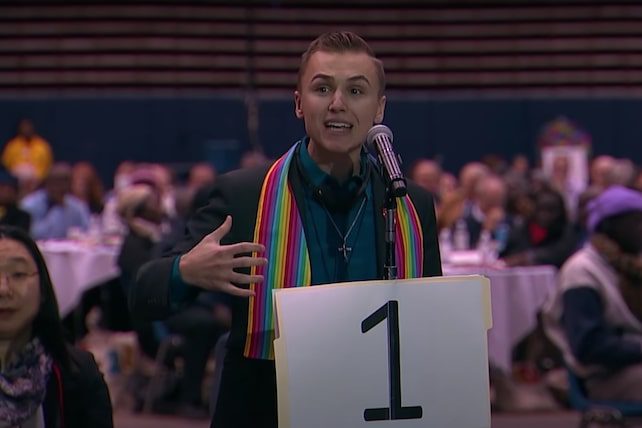Update: On the final day of the Special Session of the General Conference, the One Church Plan was officially voted down and the Traditional Plan was passed. Read our coverage of the final decision here.
Top leaders and representatives of United Methodist Churches around the world are meeting in St. Louis this week to put to rest a debate that has been occupying much time and resources and has already prompted some churches to leave the denomination. Preliminary voting in the Legislative Committee today indicates the denomination will adopt the Traditional Plan and continue its official, conservative stance toward homosexuality.
The One Church Plan Failed to Get the Votes It Needed
With a vote of 461 delegates in favor and 359 delegates against, the Traditional Plan will move on to a final vote tomorrow. However, the One Church Plan failed to pass the Legislative Committee after delegates voted 386 for and 436 against.
The Traditional Plan is favored by those in the church who wish to maintain a traditional view of marriage as being between one man and one woman. It also tightens restrictions on homosexuals who wish to serve as clergy members. Others that leaned toward allowing the church to perform same-sex weddings and ordaining openly homosexual clergy were in favor of the One Church Plan, which would allow individual churches to decide where they land on the issue of homosexual marriage and clergy.
Last year, the Council of Bishops recommended the denomination adopt the One Church Plan after it reviewed four potential plans developed by the UMC’s Committee on a Way Forward.
The global nature of the UMC has made the decision facing the denomination complicated. While listening to arguments for and against the One Church Plan, a delegate from South Congo stated the plan would “burn down the church in Africa.” Another delegate from northwest Russia articulated the plan would derail United Methodist missions in Eurasia.
Others, like delegate Byron Thomas, see the debate over homosexuality as similar in some ways to the struggle the denomination had with welcoming African Americans. “Why did black people stay in the Methodist Church? Because if the church could get it right, the world could get it right. The One Church Plan allows us to give witness to the world that we are a church who can struggle but stay together,” Thomas said.
As Pastor Adam Hamilton points out, the U.S. majority of the United Methodist Church is a little more progressive than their international peers.
#GC2019 (cont.) The One Church Plan attempted to make space for everyone. The Traditional Plan seeks to encourage progressives and centrists who disagree with conservatives on marriage to leave the denomination. 60+ percent of US delegates disagree with this plan. (cont.)
— Adam Hamilton (@RevAdamHamilton) February 25, 2019
What Is the Traditional Plan?
The Traditional Plan calls for retaining the church ban on ordination of “self-avowed practicing homosexuals,” as well as the prohibitions on clergy officiating same-sex weddings or churches hosting them. It would retain the church’s official position that the practice of homosexuality is incompatible with Christian teaching.
In addition, the Traditional Plan would call for greater enforcement of those restrictions including pushing out congregations and conferences into their own Methodist affiliations outside of the UMC if they won’t pledge to abide by church rules on homosexuality.
What Happens Now?
Tomorrow, the delegates are expected to participate in a final vote to either approve or reject the Traditional Plan. Since the One Church Plan did not make it out of committee, there is only a slim chance it could be brought forward for a vote again. Delegates will also be voting on petitions concerning churches that wish to leave the denomination.
The General Conference meets every four years to vote on issues concerning UMC churches across the globe. The conference is composed of almost 1,000 delegates that are elected by annual conferences to attend the General Conference. Half the delegates are lay members of UMC churches and half are clergy. It was decided at the last General Conference, in 2016, that a special session would be necessary in 2019 to settle the issue that has been threatening to divide the UMC for decades now.
Some churches left the denomination before this special session, however. Pastor Jeff Dunn of Christ United in Myrtle Beach, South Carolina, believes the elongated debate is evidence that the devil “has actually derailed a denomination.”

